大学英语听课记录
英语专业实习听课记录15(2)

听课记录及评价1Unit1 Makinga differe nceStep I Warming upTask 1 (class work) words present ationon the blackbo ardgenius,inspira tion, perspir ation,quote, mind, curious, be on fire for, be similar to, fearTask 2 (group work) competi tionT: Who made great contrib u tions to society and science? What great scienti sts do you know? And what are they famousf or?Ss: Maria Curie radiumand poloniu mZhang Heng seismog raph.Charles DarwinThe Theoryof Evoluti onThomasAlva Edisonthe light bulb.AlbertEinstei n The Theoryof Relativ i tyTask 3 (group work) Learnin g quotesT: Who are they on the screen?Ss: Albert Einstei n, Maria Curie, ThomasAlva EdisonT: Whom do you think these quotesare from? Do you know what they mean?S:I think it is from Edison. It means that if we make great efforts to do sth, we’ll succeed. And no matterh ow cleverh e is, a personwill fail if he doesn’t try his best. In Chinese, it means 天才就是百分之九十九的汗水加上百分之一的灵感。
大学英语听评课记录

大学英语听评课记录评课日期:[填写日期]教师姓名:[填写教师姓名]课程名称:[填写课程名称]课堂内容回顾:在本次课堂中,教师以生动有趣的方式呈现了课程内容。
通过多媒体展示和实际例子,教师成功地引起了学生们的兴趣。
课堂涵盖了以下几个主要话题:1. [填写主要话题1]2. [填写主要话题2]3. [填写主要话题3]学生参与情况:学生们在本次课堂中积极参与。
他们踊跃回答问题、提出自己的观点,并和教师及其他同学展开了讨论。
课堂氛围活跃,学生们的热情很高。
教学方法和技巧:教师采用了多种教学方法和技巧,以提高学生研究效果和兴趣。
以下是几个教学方法和技巧的示例:1. 引用生活例子:教师通过引用生活中的实际例子,使学生更容易理解抽象的概念。
2. 多媒体展示:教师使用多媒体展示来呈现文字、图像和视频等内容,增强了学生们的视觉和听觉体验。
3. 小组讨论:教师安排了小组讨论活动,鼓励学生们之间的合作和互动,提高了学生的口语表达能力。
反思与建议:在本次课堂中,教师表现出色,但也有一些可以改进的地方:1. 时间管理:课堂时间有些紧张,教师可以更加合理地分配时间,以确保每个话题都得到足够的讨论和理解。
2. 授课材料:教师可以准备更多丰富的教学材料,如实例、案例分析等,以更好地支持课堂教学。
总结:本次课堂充满活力,学生和教师之间的互动令人印象深刻。
教师的教学方法和技巧很好地促进了学生的参与和研究效果。
期待在今后的课堂中继续享受这样的教学体验。
> 注意:以上内容仅为听评课记录,不涉及课后作业和考试成绩。
辅导员 堂听课 记录表

这堂英语课的讲课知识点清晰,所选练习讲解较精当,课堂用语基本用英语,培养学生的口语表达能力。晏红老师首先给同学们播放新视野听力材料,评讲四级卷子,接着带领大家学习星火词网的新单词,并细心分析单词以及例句的难点与重点讲解。最后,进行上一节课布置单词的听写练习。
课后反馈(学生的课堂评价,辅导员听课感受)
听课记录表
课程名称
大学英语3
听课时间
10:30--12:00
教师姓名
Байду номын сангаас晏红
教师单位
重庆师范大学涉外商贸学院
授课对象
人力资源管理2班
授课地点
8407
学生
听课情况
学生出勤
情况
全勤
课堂纪律
学生上课的精神及注意力集中,课堂纪律良好
课堂气氛
上课学生们都认真听讲,回答老师问题的积极性也大
其他
教态端正,讲课投入,言行文明,师生关系融洽
晏红老师在课堂教学中表现出了扎实的教学基本功和丰富的教学经验,并展示出了教师关爱学生、循循善诱等方面的教学特点。课前准备充分,充分利用了多媒体教学,为学生创造了良好的语言学习情境,激发了学生的学习热情,调动了学生积极性。特别是在知识的引入过程中,十分注重启发学生思维,并在这一过程中努力提高学生的想象力和已有语言知识的运用能力。
听课人签名:
年月日
英语专业实习听课记录
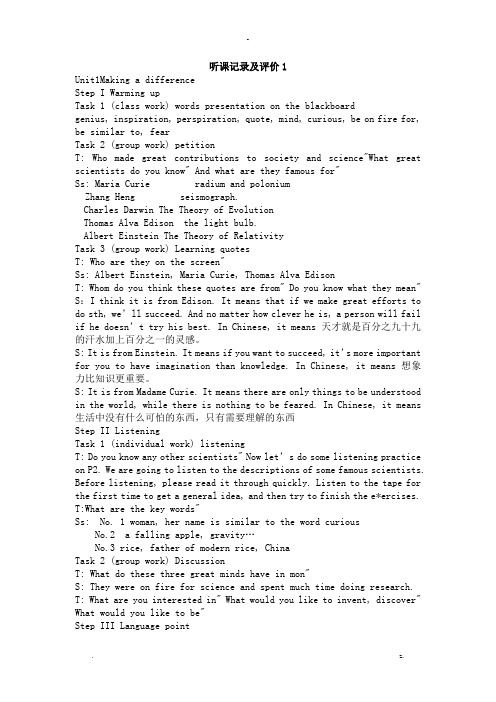
听课记录及评价1Unit1Making a differenceStep I Warming upTask 1 (class work) words presentation on the blackboardgenius, inspiration, perspiration, quote, mind, curious, be on fire for, be similar to, fearTask 2 (group work) petitionT: Who made great contributions to society and science"What great scientists do you know" And what are they famous for"Ss: Maria Curie radium and poloniumZhang Heng seismograph.Charles Darwin The Theory of EvolutionThomas Alva Edison the light bulb.Albert Einstein The Theory of RelativityTask 3 (group work) Learning quotesT: Who are they on the screen"Ss: Albert Einstein, Maria Curie, Thomas Alva EdisonT: Whom do you think these quotes are from" Do you know what they mean" S:I think it is from Edison. It means that if we make great efforts to do sth, we’ll succeed. And no matter how clever he is, a person will fail if he doesn’t try his best. In Chinese, it means 天才就是百分之九十九的汗水加上百分之一的灵感。
大学主题班会听课记录(3篇)
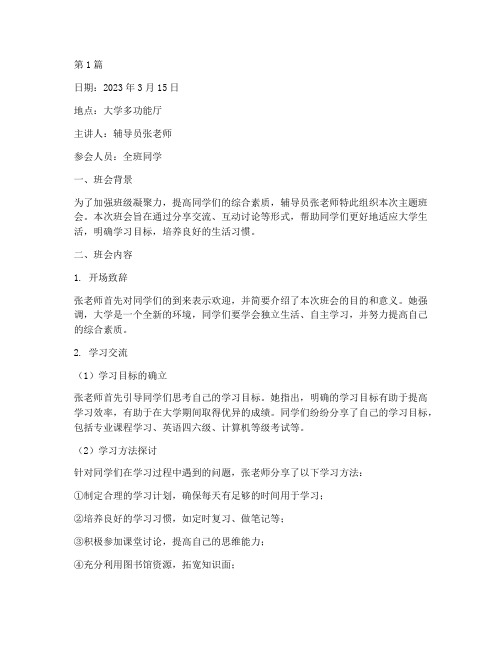
第1篇日期:2023年3月15日地点:大学多功能厅主讲人:辅导员张老师参会人员:全班同学一、班会背景为了加强班级凝聚力,提高同学们的综合素质,辅导员张老师特此组织本次主题班会。
本次班会旨在通过分享交流、互动讨论等形式,帮助同学们更好地适应大学生活,明确学习目标,培养良好的生活习惯。
二、班会内容1. 开场致辞张老师首先对同学们的到来表示欢迎,并简要介绍了本次班会的目的和意义。
她强调,大学是一个全新的环境,同学们要学会独立生活、自主学习,并努力提高自己的综合素质。
2. 学习交流(1)学习目标的确立张老师首先引导同学们思考自己的学习目标。
她指出,明确的学习目标有助于提高学习效率,有助于在大学期间取得优异的成绩。
同学们纷纷分享了自己的学习目标,包括专业课程学习、英语四六级、计算机等级考试等。
(2)学习方法探讨针对同学们在学习过程中遇到的问题,张老师分享了以下学习方法:①制定合理的学习计划,确保每天有足够的时间用于学习;②培养良好的学习习惯,如定时复习、做笔记等;③积极参加课堂讨论,提高自己的思维能力;④充分利用图书馆资源,拓宽知识面;⑤寻求同学、老师的帮助,共同进步。
3. 生活习惯养成(1)时间管理张老师强调,时间管理对于大学生来说至关重要。
她建议同学们制定时间表,合理安排学习、休息、娱乐等时间,避免拖延症。
(2)饮食健康张老师提醒同学们要注意饮食健康,合理搭配膳食,保证营养均衡。
同时,要养成良好的作息习惯,避免熬夜。
(3)锻炼身体张老师鼓励同学们积极参加体育锻炼,提高身体素质。
她建议同学们根据自己的兴趣选择合适的运动项目,如跑步、篮球、瑜伽等。
4. 互动环节(1)心理健康针对同学们在心理方面可能遇到的问题,张老师分享了以下建议:①保持乐观的心态,学会调整情绪;②学会倾诉,寻求心理支持;③积极参加社团活动,拓展人际关系;④寻求专业心理咨询。
(2)职业规划张老师提醒同学们要尽早规划自己的职业道路,明确职业目标。
大学英语听课记录范文
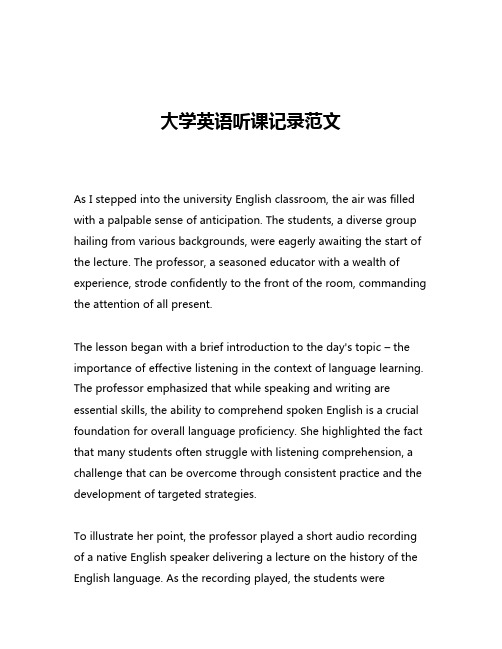
大学英语听课记录范文As I stepped into the university English classroom, the air was filled with a palpable sense of anticipation. The students, a diverse group hailing from various backgrounds, were eagerly awaiting the start of the lecture. The professor, a seasoned educator with a wealth of experience, strode confidently to the front of the room, commanding the attention of all present.The lesson began with a brief introduction to the day's topic – the importance of effective listening in the context of language learning. The professor emphasized that while speaking and writing are essential skills, the ability to comprehend spoken English is a crucial foundation for overall language proficiency. She highlighted the fact that many students often struggle with listening comprehension, a challenge that can be overcome through consistent practice and the development of targeted strategies.To illustrate her point, the professor played a short audio recording of a native English speaker delivering a lecture on the history of the English language. As the recording played, the students wereinstructed to take notes and focus on key details, such as the main ideas, supporting evidence, and any unfamiliar vocabulary. The atmosphere in the room was one of intense concentration, with the only sound being the gentle scratch of pens against paper.Once the recording had finished, the professor invited the students to share their observations and insights. A lively discussion ensued, with students raising their hands and offering their perspectives on the content of the lecture. The professor skillfully guided the conversation, asking probing questions and encouraging the students to elaborate on their thoughts. She was particularly impressed by the level of detail and nuance in the students' responses, indicating that they had indeed been actively engaged in the listening exercise.To further reinforce the importance of listening comprehension, the professor then divided the class into small groups and assigned them a task. Each group was given a different audio recording, ranging from a news broadcast to a TED talk, and were instructed to work together to identify the main ideas, key supporting points, and any challenging vocabulary. The students eagerly set to work, collaborating with their peers and actively discussing the content of the recordings.As the class progressed, the professor continued to introduce variouslistening strategies and techniques, such as predicting content, identifying key words and phrases, and using context clues to decipher unfamiliar terms. She encouraged the students to experiment with these strategies and to share their experiences with the rest of the class. The students were receptive to the professor's guidance, asking insightful questions and offering thoughtful reflections on the effectiveness of the different approaches.One particularly memorable moment occurred when the professor played a recording of a heated political debate. The students were tasked with identifying the main arguments presented by each side, as well as any instances of logical fallacies or rhetorical devices. The discussion that followed was both lively and thought-provoking, with the students demonstrating a nuanced understanding of the complexities of the topic.Throughout the class, the professor maintained a warm and engaging demeanor, fostering an environment of mutual respect and intellectual curiosity. She recognized the diverse backgrounds and learning styles of her students, and tailored her teaching methods accordingly. Whether it was through interactive group activities, individual reflections, or whole-class discussions, the professor ensured that each student had the opportunity to actively participate and contribute to the learning process.As the class drew to a close, the professor emphasized the importance of continued practice and self-reflection in the pursuit of effective listening comprehension. She encouraged the students to seek out opportunities to listen to authentic English content, such as podcasts, news broadcasts, and TED talks, and to regularly assess their progress and identify areas for improvement.The students left the classroom with a renewed sense of purpose and a deeper appreciation for the power of active listening. They recognized that mastering this skill would not only enhance their language proficiency but also open up a world of opportunities for personal and professional growth. The lessons learned in this English listening class would undoubtedly serve them well in their academic and future endeavors.。
英语听课记录范文(实用6篇)
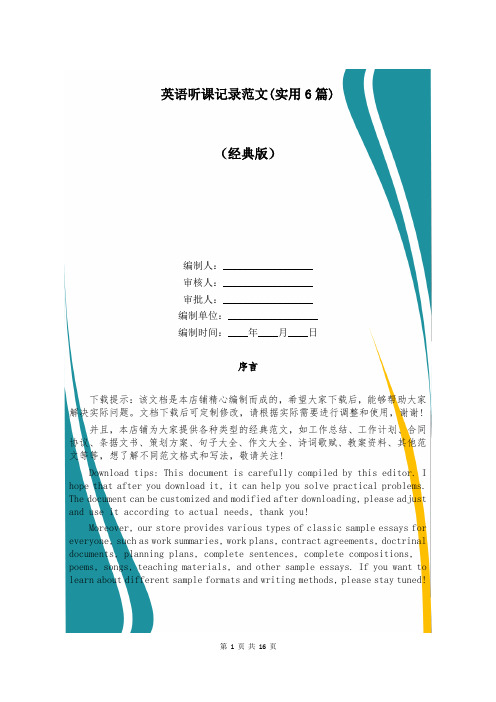
英语听课记录范文(实用6篇)(经典版)编制人:__________________审核人:__________________审批人:__________________编制单位:__________________编制时间:____年____月____日序言下载提示:该文档是本店铺精心编制而成的,希望大家下载后,能够帮助大家解决实际问题。
文档下载后可定制修改,请根据实际需要进行调整和使用,谢谢!并且,本店铺为大家提供各种类型的经典范文,如工作总结、工作计划、合同协议、条据文书、策划方案、句子大全、作文大全、诗词歌赋、教案资料、其他范文等等,想了解不同范文格式和写法,敬请关注!Download tips: This document is carefully compiled by this editor. I hope that after you download it, it can help you solve practical problems. The document can be customized and modified after downloading, please adjust and use it according to actual needs, thank you!Moreover, our store provides various types of classic sample essays for everyone, such as work summaries, work plans, contract agreements, doctrinal documents, planning plans, complete sentences, complete compositions, poems, songs, teaching materials, and other sample essays. If you want to learn about different sample formats and writing methods, please stay tuned!英语听课记录范文(实用6篇)英语听课记录范文第1篇五彩缤纷丰收11、秋天的雨香甜好闻(钥匙)传递信息欢乐听课评析这堂课的板书简明扼要地反映了课文的主要资料,脉络清楚,丰收和欢乐两个词语点明了课文的中心,深化了文章的主题。
大学英语听课记录(共5篇)
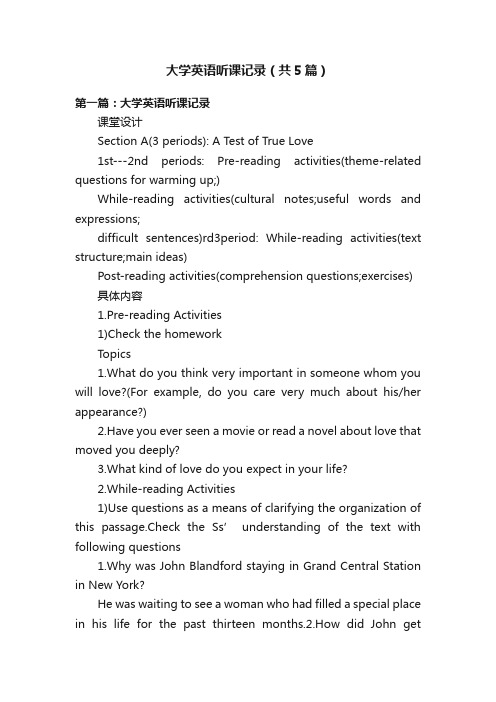
大学英语听课记录(共5篇)第一篇:大学英语听课记录课堂设计Section A(3 periods): A Test of True Love1st---2nd periods: Pre-reading activities(theme-related questions for warming up;)While-reading activities(cultural notes;useful words and expressions;difficult sentences)rd3period: While-reading activities(text structure;main ideas)Post-reading activities(comprehension questions;exercises) 具体内容1.Pre-reading Activities1)Check the homeworkTopics1.What do you think very important in someone whom you will love?(For example, do you care very much about his/her appearance?)2.Have you ever seen a movie or read a novel about love that moved you deeply?3.What kind of love do you expect in your life?2.While-reading Activities1)Use questions as a means of clarifying the organization of this passage.Check the Ss’ understanding of the text with following questions1.Why was John Blandford staying in Grand Central Station in New York?He was waiting to see a woman who had filled a special place in his life for the past thirteen months.2.How did John getconnected to the woman?3.How was John’s first response to the woman different from that of his friends?4.What had the woman, Hollis Meynell, done in the past thirteen months?She had faithfully written to John.Even when his letters did not arrive, she wrote anyway, without decrease.5.How did he feel as long as he received her letters?6.When he asked her for a photo, what did she do?7.Did Hollis Meynell come to the station as they had arranged?Yes, but she had asked a lady well over forty to wear the rose on her coat.8.Why did Hollis Meynell want to test John Blandford?2)Language Points:1.without fail:(Line 6)① when you tell sb to do sth without fail, you are telling them that they must do it;with complete certainty 务必,一定② always 总是,必定I want you here by two o’clock without fail.我要你两点钟务必来到这里。
英语听评课记录范文

英语听评课记录范文时间:2024年9月15日上午地点:XX小学六年级教室主题:听力教学听课教师:李老师(英语教师)听课学生:六年级学生听课记录:1.李老师首先布置任务,让学生们进行听力训练。
她播放了一段带有三个问题的录音,并要求学生们听取关键信息来回答问题。
2.学生们拿出笔记本和铅笔,做好记录。
李老师提醒学生们要用自己的话回答问题,而不是直接复制录音中的答案。
3. 李老师播放了第一段录音,学生们认真聆听,不时做笔记。
录音结束后,李老师让学生们用英语回答第一个问题:“Where did the girl go on her vacation?”4. 学生A:She went to the beach.5.李老师鼓励学生A的回答,并询问其他学生是否同意。
学生们纷纷表示同意。
6. 李老师继续播放第二段录音。
这次的问题是:“What did the boy see in the forest?”。
学生们认真聆听,有的学生做了更详细的笔记。
7.李老师停止了录音,让学生们回答第二个问题。
8. 学生B:He saw a deer in the forest.9.李老师点评学生B的回答,并让其他学生表达自己的看法。
学生们一致同意学生B的回答。
10. 李老师放了最后一段录音。
问题是:“What did the girl do at the party?”。
学生们再次认真聆听,并做了相应的记录。
11.录音结束后,李老师提醒学生们用自己的语言回答问题。
12. 学生C:She danced with her friends at the party.13.李老师鼓励学生C,并让其他学生评论。
学生们一致认为学生C 的回答是正确的。
14.李老师再次播放录音,并让学生们跟读录音内容。
学生们跟着录音,努力模仿发音和语调。
15.李老师总结了今天的听力训练,并提醒学生们要多加练习。
她建议学生们每天都找一些英语材料进行听力训练,以提高自己的听力水平。
英语专业听课报告(最新版)

英语专业听课报告英语专业听课报告英语专业听课报告篇一《英语专业实习听课记录15》 ..... 本节课是一节典型的阅读课,教师按照pre-reading, hile-reading和after-reading的步骤来教学,整节课调理清晰,教师提了很多问题来引发同学们的思考,且给了较多的时间来培养同学们自我阅读的习惯。
但不足的是教师没有对具体每一段做分析,可能下节课还要讲解吧。
最后教师不仅带领同学们做了课本上的几个练习,而且自己还设计了一些,新颖且贴合课本。
听课记录及评价4 Unit2 Nes media (The first period) Step 1: T: 1.Boys and girls, did you have a nice time during the summer holiday? 2. What did you do most of time? 3. Ho did you get nes ? 4. Do you usually get information and nes from TV ? 5.What else can e get nes and information from? internet/nespaper/broadcast/books.etc. 6.What is your favourite ay to get nes? Students may offer many possible ansers. T: That is good. All these things are called nes media. They let us kno hat is happening in our on country and also about the orld. We can kno all the important events . We don’t need go outside to kno these events, just staying at home and atching TV or surfing the internet. 7. Which of the nes media above is the most reliable? TV. Why? 8 .Ho are the media above different from each other? 9. Do you kno ho a nespaper is made? What about a magazine? 10. What ords ill you need to talk about nes and the media? Words: Feature shoeditor Truthful reliable press press conference report reporter revie Update sportsriter prime time mass media journalist journalism Lead story circulation deadline edition daily front page headline Issue Step 2: Listening: As the development of society, e get information and nes very directly. No you are asked To listencarefully to hat is said and tick this information you hear in each part. Let’s deal ith some ords first Fire reliable / face nosy T: Turn to page 10 and do the first exercise. 2: What kind of person is Jim Gray? Why is he no longer orking for the pany? 3: You have heard to different descriptions of hat happened to Jim Gray. Why are they different? Which one do you think is better? Comments:It is not so interesting to talk about the topic, so the Ss can‘t talk so much. 本节课作为本单元的第一节课应该是引导学生进入单元主题的课,教师很好地把握了这一点,一开始就用了很多问题来引起学生的思考以及兴趣。
英语二听课记录模板范文

英语二听课记录模板范文上午,来到**中学参加初三英语教研活动。
参加本次活动的市镇中心英语教研组的成员和全镇初三英语老师。
本次活动首先听了六峰中学朱杰红老师的一杰初三教研课,然后,大家开展了积极的教研讨论活动,最后,曾衍明主任就初三英语复习工作做了一些工作部署。
下面是这节课的听课记录和听后随感。
Teaching procedure1. 课前朗读,复习单词2. Greetings ---- What's the weather like today? Sunny.紧接着复习其他表示天气的单词。
cloudy, rainy, sunny,windy, fine, etc. 然后,启发学生说出另外一些表示天气的单词:warm, cold, cool, hot, etc. 启发的方法是通过师生问答开展的。
教师问:What's the weather will be like if it's rainy? 然后学生回答说:It'll be wet.3. 由 It's a fine day. 复习感叹句的表达形式。
How fine the day is! 当这一句话学生表述存在问题的时候,教师及时通过 What a fine day it is ! 启发,并最终让学生顺利How fine it is! 接着,进一步问道:如何赞扬一个人呢?引出下列单词:clever, smart, careful, hard,hard-working,然后说: He is a hard-working student. I'll learn from him.4. 朗读Lesson 60 课文内容,之后,通过看幻灯片,谈论图片内容;(感觉在这一过程中,教师中文组织教学太多。
如:首先,我们见到图画中有什么?像这样的句子完全可以直接用英语组织进行。
教如果能就图片提出一些目的性更强、有效性更高的问题就好了。
最新大学英语听课记录

1课堂设计2Section A (3 periods): A Test of True Love31st---2nd periods: Pre-reading activities ( theme-related questions 4for warming up;)5While-reading activities (cultural notes; useful words and 6expressions;7difficult sentences)83rd period: While-reading activities (text structure; main ideas) 9Post-reading activities (comprehension questions; exercises)10具体内容111. Pre-reading Activities12131) Check the homework14Topics151. What do you think very important in someone whom you will love? (For 16example, do you care very much about his/her appearance?)172. Have you ever seen a movie or read a novel about love that moved 18you deeply?193. What kind of love do you expect in your life?20212. While-reading Activities22231) Use questions as a means of clarifying the organization of this 24passage.2526Check the Ss’ understanding of the text with following questions27281. Why was John Blandford staying in Grand Central Station in New York? 29He was waiting to see a woman who had filled a special place in his 30life for the past thirteen months.312. How did John get connected to the woman?323. How was John’s first response to the woman different from that of 33his friends?344. What had the woman, Hollis Meynell, done in the past thirteen months? 35She had faithfully written to John. Even when his letters did not arrive, 36she wrote anyway, without decrease.375. How did he feel as long as he received her letters?386. When he asked her for a photo, what did she do?397. Did Hollis Meynell come to the station as they had arranged?40Yes, but she had asked a lady well over forty to wear the rose on her 41coat.428. Why did Hollis Meynell want to test John Blandford?43442) Language Points:45461. without fail: (Line 6) ① when you tell sb to do sth without fail, 47you are telling them that they must do it; with complete certainty 务48必,一定② always 总是,必定49I want you here by two o’clock without fail. 我要你两点钟务必来到50这里。
听课记录英语(推荐6篇)

听课记录英语(推荐6篇)听课记录英语第1篇学生对知识的掌握较好,从中可看出热爱上了这门功课,大多同学能围绕教师的提问动脑思考。
授课形式多样,通过讲授讨论朗读等方式,达到了示范课的目的。
教师能在组织旧知识的基础上讲新课,且从旧知到新知的过渡自然,学生积极性也高。
教师能很有耐心地进行个别指导,很有亲和力。
但示范效果不好,其实在这里分组学习会更好。
课前准备充分,充分利用了多媒体教学,为学生创造了良好的语言学习情境,激发了学生的学习热情,调动了学生的学习积极性。
3月6日听了邵XX老师的《美好人生我选择》——直面升学与择业,认为本节课学习内容是与学生生活、学习紧密结合、息息相关的课题,教师授课中有针对性地探讨了学生面临的问题及相应对策,教学中能密切结合校园内及学生身边熟悉的事件开展教学,深入浅出,启发学生进行思考,开展讨论。
教师语言表述清晰、精要、幽默。
建议教师要对学生的分析、提炼、总结问题的能力加强培养,提高要求。
3月8日听了陈XX老师的一堂课,认为本节语法课内容紧扣知识要点,所选内容突出了重点、难点,加深了学生的体会,便于学生理解。
教师语法授课中讲解能注意引导、启发。
在课堂中学生朗读能力培养还略显欠缺,各环节紧凑性还可加强,老师对学生纪律要提高要求。
3月8日听了秦XX老师的《透镜光的折射》一课,认为教师语言表述能力好,课堂讲解层次清晰,注重启发、拓展,教师的基本功扎实,讲解中注重知识的记忆、整理,结合习题在授课中及时巩固,并做到精批精讲,板书相当清晰、规范。
但做为复习课,对学生能力要求可再提高一些,课堂上可适当给予学生互动的空间。
教学重难点突出,板书清晰有条理。
教学步骤设计合理,由浅入深,循序渐进。
教师基本功扎实,知识讲解准确,教学设计合理,始终以学生为主体,自主学习,小组交流讨论,上台交流展示等形式,师生配合默契,取得了较好的学习效果。
听课记录英语第2篇根据四年级学生好奇心浓厚的特点,并根据小学英语中要注意培养学生发散性思维能力,认真观察,注意倾听并能用英语进行简单交流的目的,联系本课特点,从培养的语言能力入手,通过各种方式,运用学生身边的事物,合理地运用语言材料,培养学生的思维与使用英语的能力。
英语听课记录及评析范文5篇

英语听课记录及评析范文5篇英语课程的学习其实考的更多的就是单词的记忆和句型的变换,很多英语老师的上课方式或许是有好的地方,但是这不好的地方也是有的,就看看听课的老师是怎么说的吧。
英语听课记录及评析1听课人:xx授课教师李xx授课班级高一(1)班教学内容:unit 4 earthquakes period 4 listening课堂记录step 1 revision1. check the homework exercises.2. ask some students to make sentences with attributive clauses.step 2 warming uptell the students: as we all know, earthquakes are disasters to everyone. but why do earthquakes happen? can we avoid or at least reduce the losscaused by earthquakes? can we foretell earthquakes? now we will do some listening and the listening text will tell us the answers.step 3 listening (on page 62 in the workbook)1. look through the part listening on page 62 and guess what the listening material may be about. then listen to the tape for the first time to see whether their guessing is right or not.2. read the following statements and listen to the tape for the second time. then decide whether they are true or false.check the answers and try to correct the statements which are false.3. listen to the tape again and then answer the questions and complete the following sentences.part 1:1)why do earthquakes happen?2)why do california, china and japan have a lot of earthquakes?part 2:1)do not built______________.2)make sure youbuild______________.3)youmust______________._____________ buildings will fall downand_____________ onesmay______________.a few minutes later, check the answers with the whole class.4. discuss this question in small groups: why do some earthquakes kill more people than others?5. reading and retellingshow the students the listening text and let them read it. then ask them to retell the cause of earthquakes and the ways of reducing losses from earthquakes.step 4 listening task(on page 66 in the workbook)turn to page 66. look at the pictures and discuss what the might have learned.1. in four let the students discuss what would be the best way to protect oneself if there was an earthquake.2. ask one member of the group to give their ideas to the class.3. let the class 出现恶意脚本uate each groups idea and see if they agree. if they do, write the idea on the board. collect the ideas all the groups have contributed.4. ask the students to choose the three that they think are the most useful if an earthquake comes.5. listen to the tape for the first time and see if the ideas on the tape are the same. discuss why the plans on the tape are different from the onessuggested by the class.6. now make the earthquake plan. then listen to the tape for the second time to improve the earthquake plan.step 5 listening(on page 31 in using language)1. tell the students: we are going to listen to a story told by a man who was a survivor of the great san francisco earthquake of 1906.2. go through the sentences in exercise 2, then listen to the tape for the first time, and try to tell whether the statements are true or false.3. go through the questions in exercise 3, then listen to the tape for the second time and answer the questions.4. tell the students: while listening to the tape, you should not only pay attention to the contents, but also the pronunciation and intonation.5. reading and retellingshow the students the listening text and let them read it. then ask them to retell it. step 6 homework1. finish off the workbook exercises.2. read the listening texts again and try to retell them.听课评析本堂课是该单元教学的第四部分听力教学。
英语听课记录及评析范文5篇

英语听课记录及评析范文5篇1. Topic: American History- The professor discussed the American Civil War and its impact on the country. He highlighted the key events and figures that shaped this period in history, such as Abraham Lincoln and the Emancipation Proclamation.- Analysis: The lecture was comprehensive and provided a good overview of the American Civil War. It effectively conveyed the significance of this event in shaping the nation's history.2. Topic: Environmental Science- The lecture focused on the impact of climate change on biodiversity and ecosystems. The professor emphasized the need for conservation efforts and the role of various stakeholders in protecting the environment.- Analysis: The lecture effectively conveyed the urgency of addressing climate change and its impact on the environment. It provided insight into the practical stepsthat can be taken to mitigate these effects.3. Topic: International Economics- The lecture discussed the concept of globalization and its impact on trade and investment. The professor explained the benefits and challenges of global economic integration, citing examples from different countries.- Analysis: The lecture provided a clear understanding of globalization and its implications for international economics. It effectively highlighted both the positive and negative aspects of this phenomenon.4. Topic: Literature- The class focused on analyzing the themes and characters in a classic novel. The professor guided thestudents through a close reading of the text, highlighting key passages and their significance to the overall narrative.- Analysis: The lecture encouraged critical thinking and deeper engagement with the literary work. It provided valuable insights into the nuances of the novel and its underlying themes.5. Topic: Psychology- The lecture discussed the principles of cognitive development in childhood. The professor outlined the key stages of cognitive growth and the factors that influence the maturation of a child's thinking processes.- Analysis: The lecture provided a comprehensive overview of cognitive development in children. It effectively explained the theoretical framework and its practical implications for understanding human behavior.。
大学英语听课记录(精选10篇)汇总版
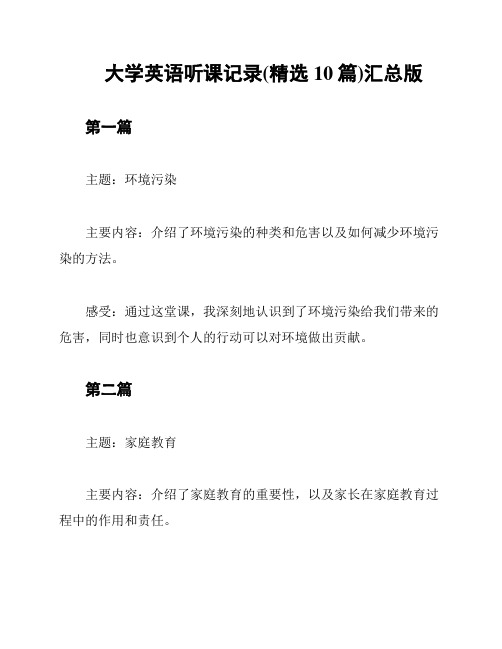
大学英语听课记录(精选10篇)汇总版第一篇主题:环境污染主要内容:介绍了环境污染的种类和危害以及如何减少环境污染的方法。
感受:通过这堂课,我深刻地认识到了环境污染给我们带来的危害,同时也意识到个人的行动可以对环境做出贡献。
第二篇主题:家庭教育主要内容:介绍了家庭教育的重要性,以及家长在家庭教育过程中的作用和责任。
感受:这堂课让我明白了家长在孩子成长过程中的重要作用,同时也提醒了我作为未来的家长应该如何去教育自己的孩子。
第三篇主题:职场沟通主要内容:介绍了在职场中如何进行有效的沟通,包括语言、态度、肢体语言等方面。
感受:这堂课让我受益匪浅,研究了在职场中进行有效沟通的方法,能够更好地处理工作场景中的各种问题。
第四篇主题:研究方法主要内容:介绍了如何高效地研究,包括计划、时间管理、复等方面。
感受:这堂课给了我很多启发,帮助我更好地规划研究时间,提高自己的研究效率。
第五篇主题:城市交通主要内容:介绍了城市交通问题,以及如何改善城市交通状况。
感受:这堂课让我加深了对城市交通问题的认识,同时也了解到了如何在自己的生活中做出改变。
第六篇主题:国际贸易主要内容:介绍了国际贸易的一些基本知识,以及国际贸易的意义和发展前景。
感受:这堂课让我了解了国际贸易在全球经济中的地位和重要性,同时也提醒了我不断提升自己的能力以参与到国际贸易中。
第七篇主题:人工智能主要内容:介绍了人工智能的发展历程、现状和未来。
感受:这堂课让我了解到人工智能在信息时代中的应用前景和发展趋势,同时也启发我在未来的研究和职业规划中应该研究哪些技能和知识。
第八篇主题:文化差异主要内容:介绍了文化差异的种类和影响,以及如何在文化差异的背景下进行交流。
感受:这堂课让我更深刻地认识到不同文化之间的差异,同时也提醒我在与不同文化的人交流时应该更加注意和尊重他们的文化背景。
第九篇主题:能源问题主要内容:介绍了世界能源问题,以及如何节约能源和开展可再生能源。
感受:这堂课让我意识到能源短缺和环境问题的严重性,同时也让我研究到了如何在日常生活中节约能源和保护环境。
英语听课记录5篇
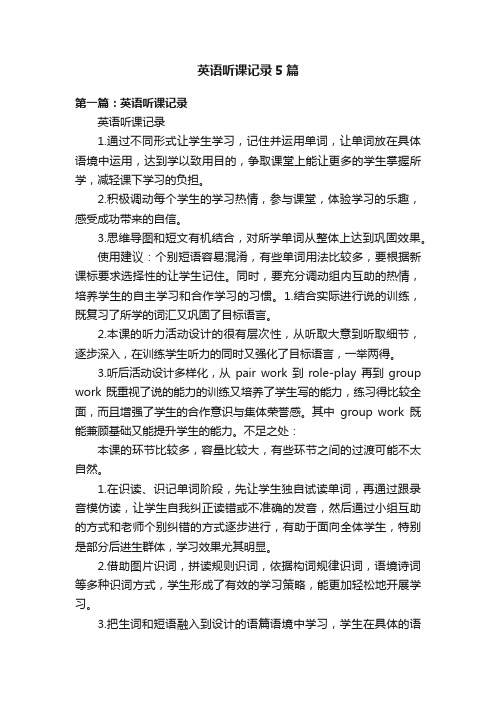
英语听课记录5篇第一篇:英语听课记录英语听课记录1.通过不同形式让学生学习,记住并运用单词,让单词放在具体语境中运用,达到学以致用目的,争取课堂上能让更多的学生掌握所学,减轻课下学习的负担。
2.积极调动每个学生的学习热情,参与课堂,体验学习的乐趣,感受成功带来的自信。
3.思维导图和短文有机结合,对所学单词从整体上达到巩固效果。
使用建议:个别短语容易混淆,有些单词用法比较多,要根据新课标要求选择性的让学生记住。
同时,要充分调动组内互助的热情,培养学生的自主学习和合作学习的习惯。
1.结合实际进行说的训练,既复习了所学的词汇又巩固了目标语言。
2.本课的听力活动设计的很有层次性,从听取大意到听取细节,逐步深入,在训练学生听力的同时又强化了目标语言,一举两得。
3.听后活动设计多样化,从pair work到role-play 再到group work既重视了说的能力的训练又培养了学生写的能力,练习得比较全面,而且增强了学生的合作意识与集体荣誉感。
其中group work既能兼顾基础又能提升学生的能力。
不足之处:本课的环节比较多,容量比较大,有些环节之间的过渡可能不太自然。
1.在识读、识记单词阶段,先让学生独自试读单词,再通过跟录音模仿读,让学生自我纠正读错或不准确的发音,然后通过小组互助的方式和老师个别纠错的方式逐步进行,有助于面向全体学生,特别是部分后进生群体,学习效果尤其明显。
2.借助图片识词,拼读规则识词,依据构词规律识词,语境诗词等多种识词方式,学生形成了有效的学习策略,能更加轻松地开展学习。
3.把生词和短语融入到设计的语篇语境中学习,学生在具体的语境中加强了对单词的理解记忆。
借助思维导图的帮助复述短文,思路清晰条例,降低了难度,增强了学生的自信心。
使用注意事项:1.本节课的容量较大,因此课前要让学生做好提前预习工作。
2.所涉及的每个环节,要以多媒体直观呈现的形式逐一展示给学生,这样才能高效率、高质量地完成学习任务。
公开课听课记录表

授课教师
职称
授课时间
授课地点
授课班级
听课人
授
课
内
容
听
课
老
师
评
议
紧紧围绕着以提高学生听说能力为主这一重点,在不增加课时和师资投入的情况下,采用基于网络的多媒体课件教学模式。符合改革试点的基本要求。试点是通过两种教学模式的对比研究进行的,采取整体抽样的方法选取学生样本;采取自荐和考察的方法选取教师样本。通过对学生的前测和后测,通过实验前和实验后对学生和教师的问卷调查,部分验证了研究初始的假设。此外,在新的教学模式引导下,学生能适时地调整自己的学习方法和学习策略,从而使学习自主性大大加强。教师也从单一的以传授语言知识为主的课堂教学模式转向以语言知识传授、学习方法和应用技能指导的,课堂教学与学生自主学习相结合的教学模式上来。对此,学生普遍欢迎,他们认为自己学习英语的兴趣增强了,他们的听说能力也获得不同程度的提高。同时,面对这样的结果,教师感到的是激励和压力。因而北京邮电大学认为非常有必要将研究进一步深入下去,进行深层次的实验,同时开展相关拓展项目的研究,相信将会得出更可信、更科学的结论。相信随着改革的推进,各个层面的问题逐渐迎刃而解。改革会在高校教师中深入人心。对于引进现代信息技术进行大学英语教学是一些教师多年的心愿,早就摩拳擦掌等待这一天了。他们认为改革是时代的要求,本次推行的大学英语教学改革对国家、对学生有好处,是一次改变传统教学体系的契机。他们以极大的热情积极投身于这次大学英语教学改革之中,进行新的网络环境下大学英语新教学模式实验研究。
备注Leabharlann 公开课听课记录表
英语听课记录及评析范文5篇

英语听课记录及评析范文5篇Yesterday, I attended an English listening class. The teacher played several audio clips of different English accents and dialects for us to practice listening comprehension. I found it challenging to understand some of the accents, especially the British and Australian ones. However, I enjoyed the diversity of voices and learned how to adapt my listening skills to different speech patterns.昨天,我参加了一堂英语听课。
老师为我们播放了几个不同英语口音和方言的音频片段,让我们练习听力理解。
我发现有些口音很难理解,尤其是英国和澳大利亚口音。
但是,我喜欢多样的声音,学会了如何适应不同的语音模式。
In addition to the accent challenge, the class also focused on listening to various types of English speech, such as formal presentations, casual conversations, and interviews. It was eye-opening to hear the different tones, pacing, and vocabulary used in each context. I realized the importance of being able to comprehend and interpret different styles of English communication in real-world situations.除了口音挑战,课堂还专注于听不同类型的英语演讲,比如正式演讲、随意谈话和采访。
大学英语课程教学听课记录范文
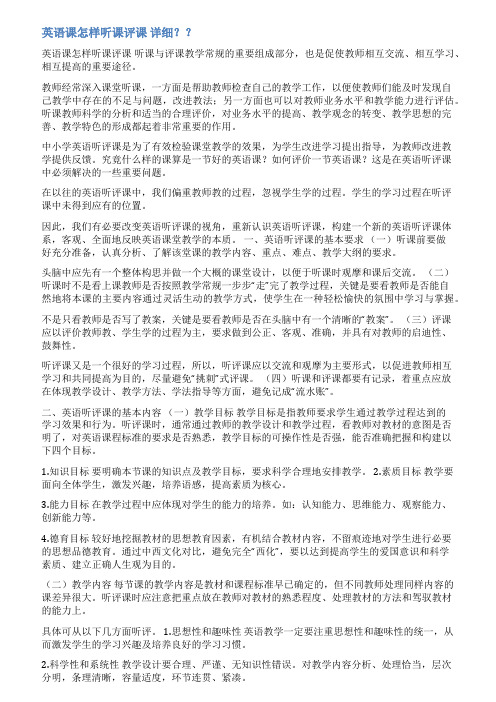
英语课怎样听课评课详细??英语课怎样听课评课听课与评课教学常规的重要组成部分,也是促使教师相互交流、相互学习、相互提高的重要途径。
教师经常深入课堂听课,一方面是帮助教师检查自己的教学工作,以便使教师们能及时发现自己教学中存在的不足与问题,改进教法;另一方面也可以对教师业务水平和教学能力进行评估。
听课教师科学的分析和适当的合理评价,对业务水平的提高、教学观念的转变、教学思想的完善、教学特色的形成都起着非常重要的作用。
中小学英语听评课是为了有效检验课堂教学的效果,为学生改进学习提出指导,为教师改进教学提供反馈。
究竟什么样的课算是一节好的英语课?如何评价一节英语课?这是在英语听评课中必须解决的一些重要问题。
在以往的英语听评课中,我们偏重教师教的过程,忽视学生学的过程。
学生的学习过程在听评课中未得到应有的位置。
因此,我们有必要改变英语听评课的视角,重新认识英语听评课,构建一个新的英语听评课体系,客观、全面地反映英语课堂教学的本质。
一、英语听评课的基本要求(一)听课前要做好充分准备,认真分析、了解该堂课的教学内容、重点、难点、教学大纲的要求。
头脑中应先有一个整体构思并做一个大概的课堂设计,以便于听课时观摩和课后交流。
(二)听课时不是看上课教师是否按照教学常规一步步“走”完了教学过程,关键是要看教师是否能自然地将本课的主要内容通过灵活生动的教学方式,使学生在一种轻松愉快的氛围中学习与掌握。
不是只看教师是否写了教案,关键是要看教师是否在头脑中有一个清晰的“教案”。
(三)评课应以评价教师教、学生学的过程为主,要求做到公正、客观、准确,并具有对教师的启迪性、鼓舞性。
听评课又是一个很好的学习过程,所以,听评课应以交流和观摩为主要形式,以促进教师相互学习和共同提高为目的,尽量避免“挑刺”式评课。
(四)听课和评课都要有记录,着重点应放在体现教学设计、教学方法、学法指导等方面,避免记成“流水账”。
二、英语听评课的基本内容(一)教学目标教学目标是指教师要求学生通过教学过程达到的学习效果和行为。
- 1、下载文档前请自行甄别文档内容的完整性,平台不提供额外的编辑、内容补充、找答案等附加服务。
- 2、"仅部分预览"的文档,不可在线预览部分如存在完整性等问题,可反馈申请退款(可完整预览的文档不适用该条件!)。
- 3、如文档侵犯您的权益,请联系客服反馈,我们会尽快为您处理(人工客服工作时间:9:00-18:30)。
课堂设计Section A (3 periods): A Test of True Love1st---2nd periods: Pre-reading activities ( theme-related questions for warming up;)While-reading activities (cultural notes; useful words and expressions;difficult sentences)3rd period: While-reading activities (text structure; main ideas)Post-reading activities (comprehension questions; exercises)具体内容1. Pre-reading Activities1) Check the homeworkTopics1. What do you think very important in someone whom you will love? (For example, do you care very much about his/her appearance?)2. Have you ever seen a movie or read a novel about love that moved you deeply?3. What kind of love do you expect in your life?2. While-reading Activities1) Use questions as a means of clarifying the organization of this passage.Check the Ss’ understanding of the text with following questions1. Why was John Blandford staying in Grand Central Station in New York?He was waiting to see a woman who had filled a special place in his life for the past thirteen months.2. How did John get connected to the woman?3. How was John’s first response to the woman different from that of his friends?4. What had the woman, Hollis Meynell, done in the past thirteen months?She had faithfully written to John. Even when his letters did not arrive, she wrote anyway, without decrease.5. How did he feel as long as he received her letters?6. When he asked her for a photo, what did she do?7. Did Hollis Meynell come to the station as they had arranged?Yes, but she had asked a lady well over forty to wear the rose on her coat.8. Why did Hollis Meynell want to test John Blandford?2) Language Points:1. without fail: (Line 6)①when you tell sb to do sth without fail, you are telling them that theymust do it; with complete certainty 务必,一定②always 总是,必定I want you here by two o’clock without fail. 我要你两点钟务必来到这里。
He writes every week without fail. 他每周必定写信。
2. Soon after he volunteered for military service, he had received a book from this woman. (Para.2)Meaning: Not long after he joined the military, he had received a book from this woman. volunteer: offer to do sth without being forced to do it or without getting paid for it 自愿做,义务做,无偿做volunteer (sth) (for/as sth)John volunteered to organize a petition. 约翰自告奋勇组织请愿/上访。
He volunteered his services as a driver. 他自愿服务充当司机。
Several staff members volunteered for early retirement. 几位职员自愿提前退休。
volunteer (for sth): join the army, etc. without being forced to 自愿参军,当志愿兵volunteer for military service / for the navy 自愿服兵役; 自愿参加海军volunteer: (n) a person who does a job without being paid for it 义务工作者,志愿者; a person who offers to do sth without being forced to do it 自告奋勇者,主动做某事的人3. And while they all got strength from it, and appreciated her support of their cause, John Blandford was the only person to write Ms. Meynell back. (Para. 2)while: (used at the beginning of a sentence) although; in spite of the fact that… (用于句首)虽然,尽管While I am willing to help, I do not have much time available.尽管我愿意帮忙,但是没有多少时间。
While (he is) respected, he is not liked. 他虽受人尊敬,却不受人喜爱。
write (sb) back; write back (to sb): write sb a letter replying to their letter(给某人)写回信,复信I’m afraid I never wrote back. 我恐怕从未写过回信。
She wrote back saying that she couldn’t come. 她回信说她来不了。
I wrote back accepting their offer. 我回信表示接受他们的提议。
4. overseas: (Line 13) (ad) in or to a country across the sea; abroad 在国外,在海外The product is sold both at home and overseas. 这个产品行销国内外。
This is Obama’s first visit overseas since taking office. 这是奥巴马就职后的首次海外之行。
live/work/go overseas 在国外生活/工作;出国overseas : (adj) coming from or happening abroad 外国的,海外的overseas markets/trade 海外市场,海外贸易overseas students/visitors 海外/外国留学生,海外/外国游客5. During the difficult days of war, her letters nourished him and give him courage. (Para. 3) Meaning: During the difficult days of war, her letters gave him strength and courage.Here, the verb “nourish” is used metaphorically, meaning “maintain, encourage, strengthen sth”. Nourish: allow a feeling, an idea, etc. to develop or grow stronger 培养,助长(情绪、观点等)By investing in education, we nourish the talents of our children.我们通过教育投资,培养孩子们的才能。
Letters of love only nourished her longing for him. 情书只是增加了她对他的思念。
University study nourished his ability to think critically. 大学学习培养了他的批判性思维能力。
6. But when he asked her for a photo, she declined his request. (Para. 4)Meaning: But when he asked her for a photo, she refused politely.decline:①refuse a request or offer, usually politely 谢绝,婉言拒绝I offered to give them a lift but they declined. 我主动邀请他们搭车,但他们婉言谢绝了。
